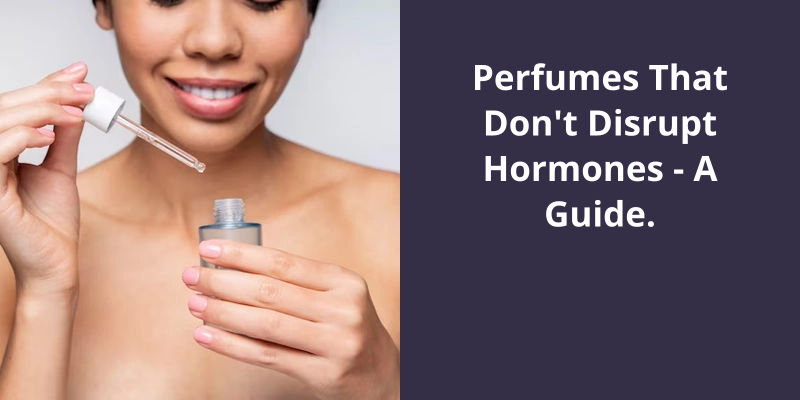Perfumes that don’t disrupt hormones are typically those made from natural, organic ingredients. Many traditional fragrances contain endocrine disruptors like phthalates, which can affect hormonal balance. Therefore, it’s beneficial to opt for hormone-friendly options. Brands like Skylar, IME Natural Perfume, and Abel offer wide ranges of natural and organic perfumes that are free from synthetic ingredients and harmful chemicals known to affect hormonal health. Always remember to check the ingredients on the label when choosing a perfume to ensure it doesn’t contain any potential hormone disruptors.

Is Parfum a Hormone Disruptor?
This can cause a multitude of health issues, as your hormones control many functions in your body, including your metabolism, growth and development, and even your mood. Hormone disruptors have also been linked to an increased risk of cancer and infertility, as they can interfere with reproductive and developmental processes.
While some fragrances may contain natural oils and ingredients, many of the synthetic chemicals used in perfumes can have serious health consequences. In addition to phthalates, fragrances may also contain musks, which have been linked to hormone disruption and can accumulate in the body over time.
Some people may be more sensitive to hormone disruptors than others, and even small exposures can cause adverse health effects. Pregnant women, for example, are particularly vulnerable to phthalates, which can cross the placenta and affect fetal development. Children may also be at risk from exposure to fragrances, as their bodies and immune systems are still developing.
To reduce your exposure to hormone disruptors, it’s best to avoid synthetic fragrances whenever possible. Look for fragrance-free or naturally-scented products, or try making your own natural perfumes using essential oils. You can also read product labels carefully and choose products that are free from phthalates and other harmful chemicals.
Finally, it’s important to remember that the fragrance industry is largely unregulated, and companies aren’t required to disclose all of the ingredients in their products. This means that even if a product claims to be phthalate-free, there may still be other hormone disruptors present. To protect your health, it’s best to be cautious and choose products that are as natural and non-toxic as possible, and to advocate for stronger regulations to protect consumers from harmful chemicals.
Natural Alternatives to Fragrance and Personal Care Products
This article discusses natural alternatives to synthetic fragrance and personal care products. It explores the benefits of using natural ingredients, such as essential oils and plant extracts, and offers suggestions for how to incorporate them into your daily routine. Natural alternatives can be gentler on the skin, eco-friendly, and provide therapeutic benefits. By making simple switches to natural products, individuals can reduce their exposure to potentially harmful chemicals while supporting their overall health and wellness.
As we become more aware of the potential risks associated with personal care products, it’s important to pay attention to the ingredients we’re putting on our skin. Fragrances, in particular, have been found to contain endocrine disruptors that can interfere with our hormonal balance. Synthetic musks, such as galaxolide, tonalide, and ethylene brassylate, are some of the most commonly used fragrance ingredients and have been linked to hormone disruption. In this article, we’ll take a closer look at these compounds and explore the potential risks they may pose to our health.
What Fragrances Are Endocrine Disruptors?
Fragrances have been a staple in personal care and household products for decades, but recent studies have raised concerns about their potential to negatively impact our endocrine systems. Endocrine disruptors are chemicals that can interfere with the normal function of hormones in our bodies. Synthetic musks like galaxolide, tonalide, and ethylene brassylate are commonly used in fragrances and have been linked to hormone disruption in numerous studies.
Galaxolide, a synthetic musk used in laundry detergents and other household products, has been found to disrupt the endocrine system in animal studies. One study found that galaxolide can mimic the hormone estrogen, which can lead to a variety of health problems such as precocious puberty and breast cancer. Another study found that exposure to galaxolide can lead to a decrease in testosterone levels in male rats.
Tonalide, another commonly used synthetic musk, has also been linked to endocrine disruption. A study published in the journal Environmental Health Perspectives found that tonalide can mimic the hormone androgen, which plays a role in male sexual development. The study also found that tonalide exposure can lead to a decrease in thyroid hormone levels in rats, which can have negative impacts on metabolism and energy levels.
A study published in the journal Toxicology Letters found that exposure to ethylene brassylate can lead to a decrease in testosterone levels in male mice. The study also found that ethylene brassylate can interfere with the production and release of several hormones in female mice.
Phthalates, for example, are commonly used as solvents in fragrances and have been found to disrupt the endocrine system in animal studies. A study published in the journal Environmental Health Perspectives found that exposure to phthalates can lead to a decrease in testosterone levels in male rats.
While many individuals may not experience any negative health effects from using fragranced products, those who’re more susceptible to hormone disruption, such as pregnant women and infants, may want to consider using fragrance-free alternatives. In addition, policymakers and regulatory agencies may want to consider further research and potential regulations on the use of these fragrances in consumer products.
How to Identify Endocrine Disruptors in Fragrances
- Look for ingredients such as phthalates, parabens, and synthetic musks.
- Research individual fragrance chemicals for any potential endocrine-disrupting effects.
- Check for any certifications or labeling indicating that the fragrance is free of endocrine disruptors.
- Avoid fragrances labeled as “fragrance oil” or “perfume oil” as these may contain synthetic chemicals.
- Consider using fragrances made from natural essential oils or plant-based ingredients.
It’s always tempting to indulge in our favorite scents, but have you ever stopped to think about the potential harm they might be causing? Fragrance mixes have been known to cause a myriad of health problems, ranging from allergies to respiratory distress. In this article, we’ll explore the potential dangers of fragrance parfum and what you can do to protect yourself.
Is Fragrance Parfum Harmful?
The use of fragrance parfum in personal care and household products has become a standard practice in our daily lives. However, concerns have been raised about the potential negative effects on our health and environment. It’s known that fragrance mixes can cause allergic reactions, dermatitis, and respiratory distress in individuals.
Although regulations are in place to ensure that fragrance parfum ingredients are safe, manufacturers aren’t required to disclose all of the ingredients used in their products. This lack of transparency has made it difficult for consumers to make informed decisions about the products they use. It’s essential for consumers to become more educated about the potential risks associated with fragrance parfum and to seek out safer alternatives.
While it adds a pleasant scent to personal care and household products, it’s important to be aware of the potential risks associated with it’s use. As consumers, we can take steps to protect ourselves and the environment by choosing products that are free of harmful fragrance mixes and advocating for more comprehensive labeling standards.
The Impact of Fragrance Parfum on Indoor Air Quality and Air Pollution
- Fragrance parfum contributes to indoor air pollution
- Volatile Organic Compounds (VOCs) are released by fragrance parfum
- VOCs can cause eye, nose, and throat irritation, headaches, and other health effects
- Fragrance parfum can also exacerbate asthma and other respiratory conditions
- Some air fresheners and products with fragrance parfum may contain harmful chemicals such as phthalates and formaldehyde
- There are natural and safer alternatives to fragrance parfum, such as essential oils and natural air fresheners
- Improving indoor air quality can have positive effects on health and well-being
Source: EWG Skin Deep® What’s FRAGRANCE
Perfume has been used for centuries as a way to enhance our mood and create a sense of well-being. Whether it’s the sweet, floral scent of a rose or the calming scent of lavender, the power of fragrance can have a remarkable effect on our mental state. While there’s no magic cure for mental health conditions, many people have found relief through the use of botanical scents. In this article, we’ll explore the connection between perfume and mental health, and how you can use fragrance to promote your own well-being.
Is Perfume Good for Mental Health?
Scents are known to have an effect on our emotions, and they’ve been used for centuries for their therapeutic properties. In fact, aromatherapy has been employed in alternative medicine to treat anxiety and depression. Perfumes offer a more accessible and enjoyable way to benefit from scent therapy than essential oils. That being said, not all perfumes are created equal. Synthetic fragrances can induce headaches and other negative reactions, especially in those who’re sensitive to them. Therefore, it’s important to choose high-quality, natural fragrances to reap the benefits.
One of the ways that perfumes can help with mental health is by promoting relaxation. Certain scents, like lavender and chamomile, have been shown to have a calming effect on the mind and body. They can help ease tension, reduce anxiety, and even improve sleep quality. Perfumes that contain these ingredients can be helpful for those who struggle with stress and anxiety disorders.
Certain scents can trigger memories and emotions that are tied to happy experiences. For example, the scent of vanilla may remind someone of baking with their grandmother, while the scent of saltwater may evoke memories of a beach vacation. Wearing a fragrance that’s positive associations can help boost mood and overall wellbeing.
In addition to promoting relaxation and creating positive associations, perfumes can also help boost confidence. According to studies, scents like sandalwood and cedarwood can be particularly effective in promoting confidence and self-assurance.
Finally, perfumes can be used as a form of self-care. Taking the time to choose a fragrance that you love and applying it mindfully can be a way to soothe the mind and promote relaxation. The act of applying perfume can also be a mindfulness practice, as it requires you to focus on the present moment and engage your senses.
Overall, there are many benefits to wearing perfume on a daily basis that go beyond just smelling good. From boosting your confidence to improving your mood, incorporating fragrance into your daily routine can have a positive impact on your overall well-being.
Why You Should Wear Perfume Everyday?
The use of perfume has been a popular practice for centuries, with it’s usage dating as far back as ancient Egypt. Perfumes were initially used for religious purposes and later adopted as a tool for personal care, and it’s no wonder that it remains a popular grooming essential today. Wearing perfume every day provides a host of benefits that keep you looking and feeling great throughout the day.
Firstly, perfumes ensure that you smell good at all times. By applying perfume, you can keep body odors in check, which may become unpleasant when you sweat or if you’ve been engaging in strenuous activities. In addition, the pleasant scent of perfume is known to uplift your spirit and boost your confidence, knowing that you smell great.
As a natural aphrodisiac, perfumes may make you appear more attractive. A good-quality scent can have a positive impact on your impression to others, especially in social situations.
Perfumes have mood-enhancing effects and may help combat stress and other anxiety-related problems. The right scent can evoke positive emotions and create a calming effect, helping to relieve stress and anxiety.
As you find scents you love and that work well for you, over time, people will come to associate that scent with you, creating an effortless and memorable personal brand.
Finally, cultivating a signature scent is an effortless way to create a memorable personal brand that people will associate with you.
The History of Perfume and How It Has Evolved Over Time.
Perfume has been used by humans for thousands of years for a variety of reasons. It’s evolved from ancient times to modern day with advancements in technology and science. Today, there are endless possibilities for creating unique scents that can be personalized to individual preferences.
It’s no secret that perfumes and fragrances are staples in many people’s daily routines, but have you ever considered the potential negative effects they may have on your brain and neuro system? Recent research suggests that the artificial chemicals in some perfumes can lead to a host of health issues, from anxiety and heart palpitations to depression. As we dive deeper into the topic, let’s explore the science behind these troubling findings and what they mean for your daily perfume habits.
What Are the Negative Effects of Perfume on the Brain and the Neuro System?
Perfume has been a popular product used by a large number of people all over the world for generations. However, despite it’s popularity, research has shown that some of the chemicals used in synthetic fragrance can have negative effects on the brain and the neurological system. These negative effects can be caused by the solvents, stabilizers, and preservatives used in the perfume.
One of the chemicals used in synthetic fragrance is Phthalates. These are chemicals used to make plastic more flexible, and they’re also used in perfumes to make the scent last longer. However, according to a recent study, some Phthalates have been found to damage the nervous system, potentially affecting the development of the brain in fetuses and young children.
Another chemical found in synthetic fragrance is styrene. Styrene is a chemical commonly found in plastics and foam products. It’s also used in perfumes to add an “aromatic” scent. According to a study published in the Biomedical Research International Journal, styrene has been known to cause depression and anxiety, affecting the neurological system and even leading to hormonal imbalances within the body.
According to an article published in the Journal of Occupational and Environmental Medicine, long-term exposure to benzene can lead to bone marrow abnormalities, anemia, and leukemia. Moreover, because it’s able to easily pass the blood-brain barrier, benzene can negatively affect the neurological system, leading to headaches, dizziness, confusion, and even seizures.
These health problems range from skin irritation and rashes to more severe symptoms such as migraines, difficulty concentrating, mood disorders, and decreased cognitive functioning.
Therefore, it’s essential to be aware of the kind of chemicals used in the fragrance that we regularly use and try to avoid synthetic fragrances as much as possible. Opting for organic, natural ingredients and essential oils can have a milder and safer long-term effect on our body and neurological system.
Conclusion
With the rise in awareness of the dangers of harmful chemicals in our everyday products, it’s crucial to be mindful of what we apply to our bodies. By opting for perfumes that are free of ingredients such as phthalates and parabens, we not only protect ourselves from potential health risks but also contribute to a safer and more sustainable future. While there’s much progress to be made in terms of regulation and transparency when it comes to the fragrance industry, consumer choice and advocacy can play a significant role in driving positive change. Ultimately, by prioritizing our health and the environment, we can enjoy the pleasures of fragrance without compromising our wellbeing.





